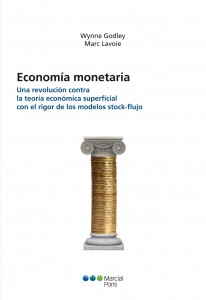Javier López Bernardo just published model LP for Chapter 5 of Godley – Lavoie Monetary Economics: Long-term Bonds, Capital Gains and Liquidity Preference
It has been added to our repository for software code. Comments are welcome
A new paper
Yannis Dafermos (2012) “Liquidity preference, uncertainty, and recession in a stock-flow consistent model”, Journal of Post Keynesian Economics, 34 (4), 749-776.
URL:
http://mesharpe.metapress.com/app/home/contribution.asp?referrer=parent&backto=issue,7,9;journal,1,40;linkingpublicationresults,1:109348,1
DOI: 10.2753/PKE0160-3477340407
Abstract:
This paper develops a stock-flow consistent model that explicitly integrates the role of liquidity preference and perceived uncertainty into the decision-making process of households, firms, and commercial banks. Emphasis is placed on (1) the link between the precautionary motive and the asset choice of the private sector, (2) the effect of perceived uncertainty on the desired margins of safety and borrowing, and (3) the impact of financial obligations on the liquidity preference of households and firms. Performing a simulation experiment, the paper illuminates the channels through which a rise in perceived uncertainty is likely to set off a recessionary process.
Keywords: liquidity preference, perceived uncertainty, recessionary process, stock-flow consistent modeling
SFC modeling in Paris
 At the Conference on Political Economy and the outlook for capitalism there will be several sessions on stock-flow models.
At the Conference on Political Economy and the outlook for capitalism there will be several sessions on stock-flow models.
Papers listed in the program include:
Michael Clévenot, Jacques Mazier and Yann Guy, Estimation et simulation d’un régime de croissance financiarisée avec un modèle SFC
Edwin Le Heron and Toussaint Bakala, Generalized liquidity preference theory in a SFC model and financial crisis
Amine Marouane, La révolution tunisienne: enjeux et perspectives à partir d’un modèle SFC
James Juniper, Modern Money Theory (MM) and Minsky: Towards a Stock-flow-Consistent (SFC) Synthesis
Stefano Lucarelli, A Stock-Flow Analysis of a Schumpeterian Innovation Economy: The Role of Knowledge(s) in the Economic Development
Vincent Duwicquet and Jacques Mazier, Ajustement et redistribution en union monétaire
Marc Lavoie, Le modèle SFC à trois pays et deux banques centrales à la lumière de la crise de la zone euro
Jamel Saadaoui, Modèle SFC à deux pays avec financiarisation et changes flexibles
Pascal Seppecher, em>Agents hétérogènes et monnaie endogène dans un modèle SFC
Alessandro Caiani, Stefano Lucarelli and Antoine Godin, Schumpeter in a matrix: a Stock Flow Consistent analysis of technological change
Tarik Mouakil, A Minsky Crisis in a Stock-Flow Consistent Model
Ahmed Hammadache and Vincent Duwicquet, Prix pétroliers et déséquilibres internationaux avec l’apport d’un modèle SFC
Stephen Kinsella and G. Tiou-Tagba Aliti, Simulating the impact of austerity on the irish economy using a stock-flow consistent model
Gennaro Zezza, Using SFC models for the analysis of European economies
Antoine Godin, Green Jobs for full employment, a Stock Flow Consistent analysis
It looks like the largest gathering of SFC modeler so far!
Files from SF lab, day #2
On the second day we introduce an investment function and explore model properties by shocking parameters.
Lab Files #2
Rename the .txt file to .prg to run it into Eviews
Finally we prepare a more complex accounting structure for the last lab exercise (excel file)
Stock-flow models lab at Levy
In the first day at the stock-flow lab at the Minsky Summer Seminar we show how to build a very simple model.
Files from Class #1
We note that although the accounting is consistent, the model structure is inconsistent since the stock of capital is growing while gdp converges to a steady state.
Warning for those who already downloaded the zip file! The program file I published yesterday was incomplete. I have now updated it, please download it again.
An interview with Marc Lavoie
Philip Pilkington is publishing a very interesting interview with Marc Lavoie on Monetary economics
Stock-flow modeling at the Levy
The Levy Institute organizes the 2012 Minsky Summer Seminar, which will include a rich series of lectures on financial balances, stock-flow consistent models, and a stock-flow lab. We will publish teaching materials from the lab later on.
Back on-line
From Gabor Kurthy
Received from Gabor Kurthy (Corvinus University, Budapest)
“I’d like to contribute to the sfc-models.net page by sending the solution of model REG (pp.: 170-186).
In the PDF file you will find the solution of the model. If you are interested, I can send you a more detailed paper that contains the steps of the solution and some analysis as well (I haven’t translated that paper yet).
In the Excel file you will find the model: I wrote three macros to
(1) compute different steady states by changing the parameter set (policy variables included)
(2) see the evolution from state zero to the steady state (parameters and policy variables can be changed)
(3) see the effects of different shocks after changing the parameters or the policy variables.
I hope that you will find it useful.”
